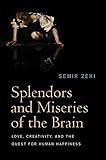Splendors and miseries of the brain : love, creativity, and the quest for human happiness / Semir Zeki, Monographie imprimée
Language: anglais ; 639-2.Country: GrandeBretagne.Publication : Chichester, UK, Oxford, UK, Malden, Mass. : Wiley-Blackwell, 2009Description: 1 vol. (VIII-234 p., [2] p. de planches) : ill. ; 24 cmISBN: 978-1-4051-8558-5; 978-1-4051-8557-8.Dewey: 612.8/2, 22Classification: 2008 N-544 ; WL 300, Z49s 2009Contents note: Abstraction The brain and its concepts Inherited brain concepts The distributed knowledge-acquiring system of the brain The acquired synthetic brain concepts The synthetic brain concept and the platonic ideal Creativity and the source of perfection in the brain Ambiguity in the brain and in art Processing and perceptual sites in the brain From unambiguous to ambiguous knowledge Higher levels of ambiguity Michelangelo and the non-finito Paul Cézanne and the unfinished Unfinished art in literature Conte by Arthur Rimbaud The brain's concepts of love The neural correlates of love Brain concepts of unity and annihilation in love Sacred and profane The metamorphosis of the brain concept of love in Dante Wagner and Tristan und Isolde Thomas Mann and Death in Venice A neurobiological analysis of Freud's civilization and its discontents Abstract: This work examines the elegant and efficient machinery of the brain, showing that by studying music, art, literature, and love, we can reach important conclusions about how the brain functions. It discusses creativity and the search for perfection in the brain; examines the power of the unfinished and why it has such a powerful hold on the imagination; discusses Platonic concepts in light of the brain; shows that aesthetic theories are best understood in terms of the brain; discusses the inherited concept of unity in love using evidence derived from the world literature of love; addresses the role of the synthetic concept in the brain (the synthesis of many experiences) in relation to art, using examples taken from the work of Michelangelo, Cezanne, Balzac, Dante, and others.Bibliography: Notes bibliogr. p. [213]-226. Index.Subject - Topical Name: Cerveau, Physiologie | Concepts Physiologie | Abstraction Physiologie | Créativité Physiologie | Amour Physiologie List(s) this item appears in: 2023-Amour (BUP)| Item type | Home library | Collection | Call number | Status | Date due | Barcode | Item holds |
|---|---|---|---|---|---|---|---|
| Prêt normal | Bibliothèque provisoire Bron Salle de lecture | Psychologie | 612.82 ZEK (Browse shelf (Opens below)) | Available | 0379097681 |
Notes bibliogr. p. [213]-226. Index
Abstraction The brain and its concepts Inherited brain concepts The distributed knowledge-acquiring system of the brain The acquired synthetic brain concepts The synthetic brain concept and the platonic ideal Creativity and the source of perfection in the brain Ambiguity in the brain and in art Processing and perceptual sites in the brain From unambiguous to ambiguous knowledge Higher levels of ambiguity Michelangelo and the non-finito Paul Cézanne and the unfinished Unfinished art in literature Conte by Arthur Rimbaud The brain's concepts of love The neural correlates of love Brain concepts of unity and annihilation in love Sacred and profane The metamorphosis of the brain concept of love in Dante Wagner and Tristan und Isolde Thomas Mann and Death in Venice A neurobiological analysis of Freud's civilization and its discontents
This work examines the elegant and efficient machinery of the brain, showing that by studying music, art, literature, and love, we can reach important conclusions about how the brain functions. It discusses creativity and the search for perfection in the brain; examines the power of the unfinished and why it has such a powerful hold on the imagination; discusses Platonic concepts in light of the brain; shows that aesthetic theories are best understood in terms of the brain; discusses the inherited concept of unity in love using evidence derived from the world literature of love; addresses the role of the synthetic concept in the brain (the synthesis of many experiences) in relation to art, using examples taken from the work of Michelangelo, Cezanne, Balzac, Dante, and others


